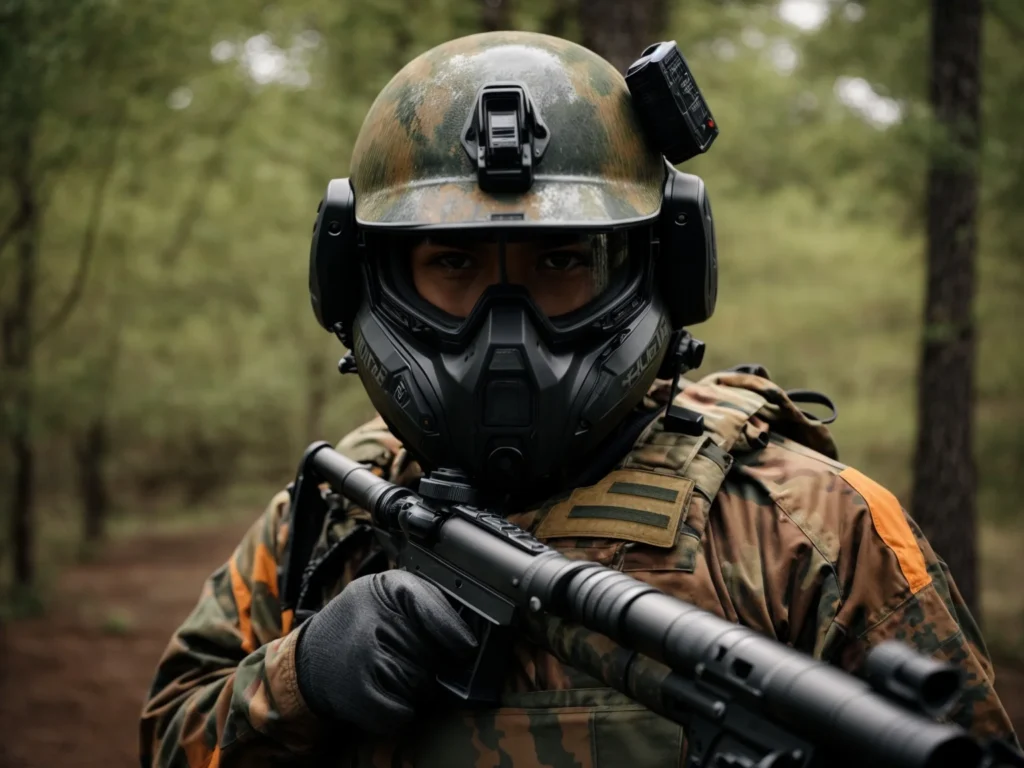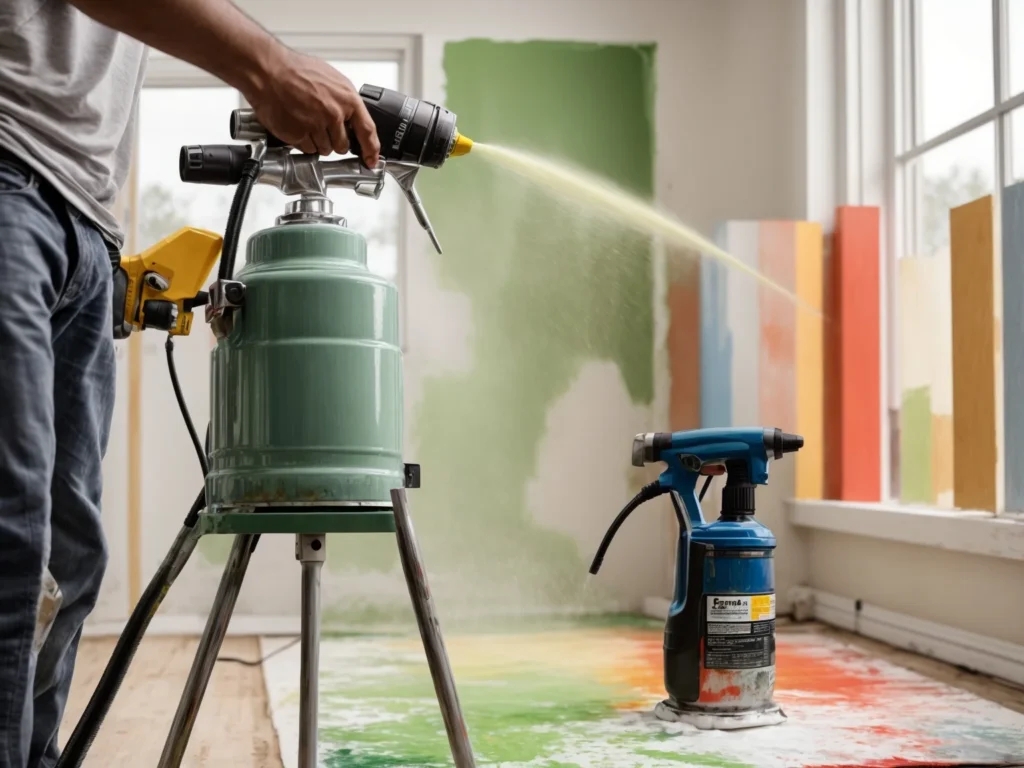The question of whether a convicted felon can legally own a paintball gun requires an examination of both federal and state laws. Paintball equipment is generally not considered a firearm under federal law, but certain states prohibit felons from possessing paintball guns or restrict their use. This article will provide an overview of paintball gun laws and regulations that apply to felons.

What Are Paintball Guns and How Are They Classified?
Paintball guns are devices used to mark opponents with paint-filled capsules during recreational games of paintball. They use compressed air or carbon dioxide to propel the paintballs through the barrel at low velocities.
Most paintball markers are considered pneumatic guns that work similarly to BB, airsoft, and pellet guns. They are not classified as firearms under federal law and are not regulated by the Bureau of Alcohol, Tobacco, Firearms and Explosives (ATF).
The key factors that distinguish paintball guns from real firearms include:
- Paintball guns have a low muzzle velocity, usually around 300 feet per second. Real firearms have velocities over 700 fps.
- The projectiles are paintballs designed to mark objects on impact, not actual ammunition.
- The barrels are smoothbore rather than rifled barrels found in guns.
- There is no explosion or combustion. The guns use mechanical or pneumatic power.
So under federal law, paintball guns are not considered firearms or weapons. They are legal for anyone to own except convicted felons in states with laws prohibiting felons from possessing them.
Federal Law and Paintball Guns
Under the Gun Control Act of 1968, the definition of a firearm excludes antique firearms, pellet guns, and BB guns. So at the federal level, paintball guns are not classified as firearms since they more closely resemble pellet or BB guns.
The ATF enforces federal firearms laws but has no jurisdiction over paintball markers. So there are no federal restrictions on the general ownership of paintball equipment.
This means paintball guns can be purchased by adults without any licensing, registration, or background checks. However, restrictions may apply under state laws and local ordinances.
Some key federal laws and their implications for paintball guns:
- National Firearms Act (NFA) – Regulates the possession of machine guns, silencers and other specialty weapons. Does not apply to paintball equipment.
- Gun Control Act – Prohibits felons, domestic abusers, and certain individuals from buying real firearms and ammunition. Does not restrict paintball guns.
- Brady Handgun Violence Prevention Act – Requires background checks for firearm purchases from licensed dealers. Does not cover paintball sales.
So in summary, federal law places no restrictions on general ownership of paintball guns. But state laws may prohibit certain persons like felons from possessing them.
Overview of Rights and Restrictions for Felons
Felons face many legal restrictions under federal and state laws. The extent of these restrictions depends on the specific offense, sentence and jurisdiction.
Some of the common rights and privileges revoked include:
- Voting – Most states prohibit felons from voting while incarcerated and on parole or probation. Some states impose longer voting bans.
- Firearms Possession – Federal law bans possession of real guns and ammunition by all convicted felons. Many states also prohibit felons from owning airsoft, BB and pellet guns.
- Public Office – Felons are often ineligible to hold public offices, ranging from local government to Congress. Some states allow restoration of rights.
- Professional Licenses – Felons can be denied professional licenses for certain jobs related to schools, real estate, medicine, and liquor sales.
- Public Housing – Federal housing programs may exclude applicants with a criminal record involving certain offenses.
- Student Loans – Eligibility for federal student aid is suspended for drug-related offenses.
When it comes to recreational hobbies and activities, laws concerning equipment possession and use can vary significantly by state. Next, we’ll look at state laws affecting felons and paintball guns.
How State Laws Treat Paintball Guns for Felons
While federal law does not restrict general possession of paintball equipment, several states prohibit convicted felons from owning or using paintball guns:
States Banning Paintball Possession by Felons
- New Jersey – Felons are prohibited from owning paintball guns, including antique guns. BB, air and pellet guns are also restricted.
- Rhode Island – Felons convicted of crimes of violence are banned from possessing paintball equipment. Air rifles are also prohibited.
- Florida – Paintball guns are classified as “weapons” making possession by convicted felons a third-degree felony. BB guns are also included.
States Allowing Paintball Use with Restrictions
- Michigan – Felons may possess paintball guns but cannot purchase, own or transport realistic imitation firearms.
- Oregon – Although felons may use paintball markers, they are prohibited from owning imitation firearms.
- Wisconsin – Felons may possess paintball equipment but cannot own BB or pellet guns.
As you can see, state laws vary widely when it comes to recreational equipment restrictions for felons. Be sure to consult your state’s specific statutes for any prohibitions that apply to paintball guns or related equipment.
Local city or county laws may also impact a felon’s ability to participate in paintball activities. Next we’ll look at licensing requirements.
Are Paintball Guns Subject to Licensing Requirements?
Most states do not require any special license or permit to purchase or own paintball markers or related equipment:
- Paintball guns are not classified as firearms at the federal level or in most states.
- No background checks are mandated by federal or state law for commercial sales.
- No minimum age restrictions exist except for local field or store policies.
However, certain jurisdictions do have licensing or registration mandates that apply to paintball equipment:
- New York City – Possession of paintball guns requires a one-year NYC Air Pistol License issued by police department.
- Chicago – Owners must have a Chicago Firearm Permit and register paintball guns with the city.
- Massachusetts – Some towns require a firearm ID card with approval by the chief of police to possess paintball guns.
- Rhode Island – Purchase, possession and use of paintball guns requires a state permit issued by local authorities.
- New Jersey – A state firearms purchaser ID card is needed to buy, own or possess paintball equipment.
So in a few localities, felons may not be able to obtain the necessary permits or licenses to legally buy or own paintball equipment. Always check your municipal codes for any requirements.
Next we’ll examine some considerations around participating in organized paintball activities.
Can Felons Play Paintball Games and Use Paintball Facilities?
For a convicted felon, playing paintball at a commercial field or facility raises some important legal considerations:
- Parole Restrictions – Felons on parole or probation must comply with terms restricting possession of weapons or firearm-like devices. Paintball may be prohibited.
- Facility Policies – Many paintball fields have policies requiring background checks and prohibiting those with criminal records from participating.
- Equipment Possession – In states restricting paintball possession, mere use or handling could be a violation.
- Property Carry – Transporting paintball gear to and from the facility may be unlawful possession in some states.
To legally play, felons should:
- Research state laws and talk to their parole officer if on supervised release.
- Call ahead to confirm the facility’s policies allow those with convictions to participate.
- Consider having equipment provided at the site rather than bringing their own.
- Get any required permits or licenses if mandated locally.
While paintball can serve as a positive recreational activity, felons need to ensure they follow all laws and parole terms first.
Legal Issues Around Carrying and Displaying Paintball Guns
For felons, legal issues can also arise surrounding the public carrying and displaying of paintball guns even for transport to facilities:
- Public Perception – Carrying paintball equipment may alarm people and be perceived as a threat if mistaken for a real gun.
- Law Enforcement – Police may treat public paintball display as a potential public safety risk requiring investigation.
- State Laws – Some states prohibit carrying imitation firearms in public without specific recreational purpose.
- Parole Violations – Felons on parole could face revocation if carrying anything resembling a weapon.
To avoid violations when transporting:
- Keep paintball gear concealed from public view in a locked case.
- Remove any imitation firearm stocks and coloring.
- Transport gear directly to and from approved recreational events.
- Know state laws on possessing imitation guns and replica firearms.
- Do not display or expose paintball equipment in public view.
Proper handling and transport of paintball equipment is crucial for felons to avoid legal trouble or probation revocation. Discretion is key even in states where possession may be legal.
Guidelines for Felons Owning Paintball Equipment
For felons residing in states permitting paintball possession with certain stipulations, here are some guidelines for legally owning and using paintball guns:
- Research State Laws – Consult statutes to confirm paintball possession is allowed and understand any restrictions.
- Ineligible Persons – Those with certain violent felony convictions may still be prohibited under state laws.
- Parole Terms – Abide by any prohibitions on replica firearms or conditions regarding weapons.
- Licensing – Obtain any required permits, licenses or firearm ID cards mandated locally.
- Safe Storage – Keep paintball guns securely locked in a safe, case or cabinet when not in use.
- Private Property – Use and maintain paintball equipment only on private property, not in public view.
- Transport Protocol – Discretely transport gear in locked cases directly to and from approved recreational sites.
Responsible ownership is key to avoiding legal issues. Felons should always put safety and compliance first when owning paintball equipment.
Notable Legal Cases Involving Felons and Paintball Guns
There have been some high-profile cases where felons have faced additional charges for illegally possessing paintball equipment:
- New Jersey, 2013 – A convicted felon was arrested for owning a paintball gun in violation of state law banning imitation firearms. He faced 3-5 years in prison if convicted.
- Florida, 2009 – Police discovered a paintball gun in a convicted felon’s home during a probation visit. He was charged with a felony carrying up to 3 years imprisonment.
- Rhode Island, 2007 – A felon caught with a paintball rifle and pellets after being previously convicted of domestic assault received a 10-year federal prison sentence for weapons charges.
These cases demonstrate the serious legal consequences felons can face if caught owning or handling restricted recreational equipment, even if their intent is harmless. Prohibitions on items like paintball guns frequently net felony convictions.
Frequently Asked Questions
Can a felon go paintballing legally?
It depends on state law and parole conditions. Felons are banned from participating in paintball activities in states prohibiting possession like New Jersey. Other states may allow recreational paintball on a case-by-case basis. Felons should research their state laws and check with their parole officer.
Is it illegal for a felon to carry a paintball gun in public?
Most states restrict felons from possessing any imitation firearms in public spaces. Carrying or displaying a paintball marker outside of approved recreational events can result in weapons possession charges, even if transporting it to a legal facility. Discreet, direct transport is required.
Do paintball guns require background checks or registration?
No federal laws mandate background checks or registration of paintball equipment. But certain states and cities do require permits, firearm ID cards or registration for paintball guns that felons would likely be unable to obtain.
Can a felon use a paintball gun for self-defense?
Likely not. Paintball markers are inappropriate for self-defense purposes. Additionally, using one could constitute illegal weapons possession. Pepper spray or alarms are better non-lethal self-defense choices.
Are paintball guns treated like real firearms in airports?
No, airport security recognizes paintball equipment as distinct from actual firearms. But markers should still be transported in checked luggage, declared to the airline and securely stowed to avoid any confusion. Carry-on restrictions still apply to compressed gas cylinders.
Conclusion
In summary, whether a convicted felon can legally possess and use paintball guns largely depends on state laws, as federal regulations do not restrict general paintball ownership. But felons face complete bans in states like New Jersey and Rhode Island. Other states allow recreational paintball under certain licensing conditions. Understanding and strictly adhering to all state and local paintball equipment laws is crucial for felons to avoid violating their probation terms or facing new criminal charges. While paintball can serve rehabilitative purposes, felons must be vigilant and responsible when handling any gun-like sporting equipment.






